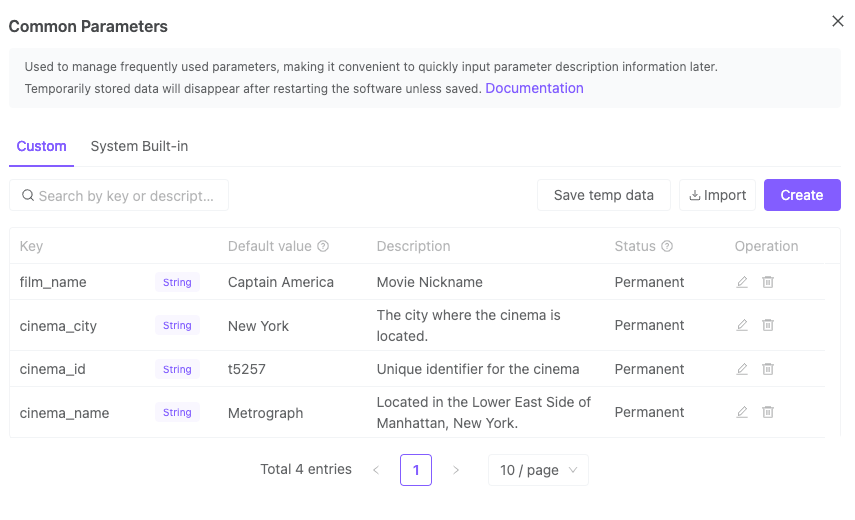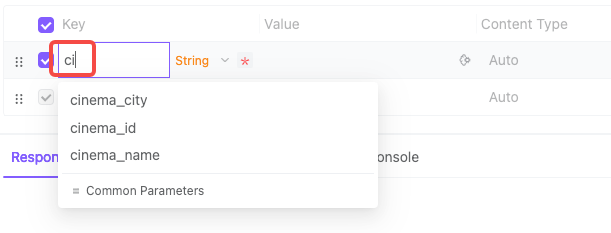Still Manually Filling Parameters in Postman? EchoAPI's Smart Memory Skyrockets API Debugging Efficiency!
This article introduces how EchoAPI's innovative parameter description library allows developers to define parameters once and benefit throughout the project lifecycle, ushering in a new era of smart and efficient API development.
In the fast-paced world of API development, efficiency is key. Developers often find themselves mired in repetitive tasks like manually entering parameters such as 'pageSize' and 'timestamp' for each interface. These tedious processes not only consume valuable time but also increase the risk of errors.
This article introduces how EchoAPI's innovative parameter description library allows developers to define parameters once and benefit throughout the project lifecycle, ushering in a new era of smart and efficient API development.
At 2 a.m., programmer Nizzy is filling in the version parameter for the same interface for the 37th time, mechanically entering 'v1.0.0' when a coffee cup is suddenly knocked over—this is the third operational error this week due to repetitive tasks. Does this scenario sound familiar? Data shows that 42% of time in API development is spent on repetitive parameter entry. But today, I'm here to reveal a game-changing truth: these repetitive tasks shouldn't exist in the first place!
While Postman users are still using Ctrl+C/V to fight the parameter entry quagmire, EchoAPI's Common Parameters has already achieved smart memory. It's like equipping interface debugging with an autopilot system, automatically filling in complete descriptions, sample values, and validation rules whenever the same parameter is encountered. This is not only a revolution in efficiency but also a redefinition of the development workflow.
▶ Act 1: Building Your Parameter Knowledge Base
- In the EchoAPI debugging panel, right-click any parameter (e.g., version)
- Select "Save to Common Parameters" to trigger smart recognition
- Witness the magic moment: the system automatically extracts data types, default values, and format requirements
- Add business comments (e.g., "Version numbers follow semantic versioning standards")

Controlled experiment: Postman requires manual creation of global variables and cannot automatically associate parameter descriptions.
▶ Act 2: Smart Filling in Practice
When creating a new test interface:
- As you start entering the parameter key name version, a candidate list automatically pops up
- Select version:
√ Parameter type: string
√ Sample value: v1.0.0
√ Validation rule: ^v\d+.\d+.\d+$
√ Detailed description: Version numbers must comply with semantic versioning standards

Search and use

Pitfall avoidance guide: When parameters have multi-version differences, achieve precise matching through the namespace function (e.g., payment_v1/version) to avoid parameter pollution.
▶ Act 3: One-Click Extraction of Response Results to Documentation
- After completing debugging, in the response area, click 【Response Sample】
- Click the 【Import from Existing Response】 button, then click 【Field Description】
- The response sample will be automatically added to the documentation, and the field descriptions will also be automatically supplemented!
Test data shows that compared to traditional methods, the time to create an interface document with 20 parameters has been reduced from 18 minutes to 2 minutes.
Comparative Evaluation Zone
Tool matrix horizontal evaluation (based on real e-commerce project scenarios):
| Functional Dimension | EchoAPI | Postman |
|---|---|---|
| Parameter Reuse Response Speed | 0.3 seconds | Manual search required (5s+) |
| Associated Field Coverage Rate | 98% | 62% |
| Cross-Project Sharing Capability | Group-level sharing | Workspace only |
| Smart Error Correction Suggestions | Real-time prompts | None |
While you're still repeatedly filling in generic parameters like 'pageSize' and 'timestamp' for each interface, EchoAPI users have already entered the smart era of 'define once, benefit for life' through the parameter description library.









 EchoAPI for VS Code
EchoAPI for VS Code

 EchoAPI for IntelliJ IDEA
EchoAPI for IntelliJ IDEA

 EchoAPl-Interceptor
EchoAPl-Interceptor

 EchoAPl CLI
EchoAPl CLI
 EchoAPI Client
EchoAPI Client API Design
API Design
 API Debug
API Debug
 API Documentation
API Documentation
 Mock Server
Mock Server




